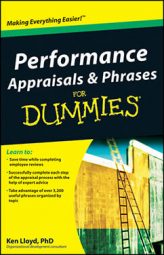One of the major objectives of performance appraisals is to provide employees with targeted feedback and guidance to help them learn, grow, and develop. Without a developmental component, performance appraisals would be relegated to the role of a mirror, showing employees how their performance looks but providing no help, support, or guidance to do anything about it.
Employee self-development is not a one-dimensional concept. Instead, in order for feedback in this area to have its intended positive impact, it needs to focus on the key components of development and growth. You need to include instructive phrases on such topics as training, personal goals, career planning, seeking learning opportunities, building problem-solving skills, widening one’s knowledge base, and more.
Personal goals
Exceptional: Consistently exceeds expectations
Has a clear vision of his future and works diligently to make it a reality
Has a strong personal goal orientation, which has inspired fellow employees to follow suit
Strives to attain personal goals that easily elude others
Takes responsibility for her personal growth and development
Consistently meets his personal objectives and then sets new ones that are even more challenging
Establishes clear and challenging short-term and long-term personal goals
Demonstrates great initiative and energy in pursuing her personal goals
Excellent: Frequently exceeds expectations
Establishes clear, specific, and measurable personal goals
Has attained his personal goals, which has led to markedly improved performance
Sets goals that are all accompanied by well-designed action plans
Devotes major effort to reaching her personal goals
Is able to meet his personal goals while also meeting his performance goals
Continues to set increasingly challenging personal goals
Shows great confidence regarding her ability to meet personal goals
Fully competent: Meets expectations
Takes his personal goals seriously
Listens to counsel from others regarding her personal goals and the best strategies to meet them
Sets challenging yet realistic goals regarding his skills, education, and career
Has established personal goals and a path to meet them
Obtains the training that is needed to achieve her personal goals
Helps other employees determine their personal goals
Shows a high degree of tenacity in pursuing his personal goals
Marginal: Occasionally fails to meet expectations
Sets personal goals, but none that would enhance her performance on the job
Takes no serious steps to meet his personal goals
Sets very general personal goals
Sets unchallenging personal goals
Hasn’t made a serious commitment to meeting her personal goals
Sets lofty personal goals but has no plans or strategies to meet them
Demonstrates very little persistence in the pursuit of personal goals
Unsatisfactory: Consistently fails to meet expectations
Has established no goals to further develop his skills, abilities, or expertise
Accepts no responsibility for setting her own personal goals
Has had the same personal goals for an extended period of time and has failed to meet any of them
Gives up easily in the pursuit of his personal goals
Jumps from one personal goal to another but reaches none
Pursues personal goals at the expense of performance goals
Responding to performance appraisals and coaching
Exceptional: Consistently exceeds expectations
Fully commits herself to following specific action plans to make improvements noted in her performance appraisal
Accepts constructive feedback positively and is highly oriented toward making improvements in areas discussed with him
Makes immediate corrective action based on the coaching that she receives
Actively seeks coaching and uses it wisely
Carefully considers every point in his performance appraisal and takes specific steps to deal with each
Excellent: Frequently exceeds expectations
Appreciates coaching and acts on the feedback that she receives
Uses the feedback from his performance appraisal and coaching to fine-tune his skills
Has been taking highly effective steps to upgrade her performance in areas that were noted in her last performance appraisal
Accepts feedback in his performance appraisal with an open mind and readiness to take action
Has taken her skills to an entirely new level by focusing on the coaching that she has received
Fully competent: Meets expectations
Takes performance appraisal feedback seriously and has made many improvements based on it
Pays careful attention to the coaching that he receives and has upgraded his performance as a result
Takes appropriate steps to follow the action plan and improve her performance in areas noted in her performance appraisal
Has taken actions as a result of his most recent performance appraisal, which have led to marked improvements in performance
Is highly receptive to coaching and managerial feedback
Marginal: Occasionally fails to meet expectations
Reacts defensively to feedback on her performance
Appears to listen to coaching but then makes no changes in his behavior
Needs frequent prodding before taking any action on feedback in her performance appraisal
Makes a few quick and easy changes after being coached but ignores the larger issues
Asks no questions during the coaching sessions and then heads off in the wrong direction
Immediately reacts to any constructive feedback with denial
Commits to taking corrective action after his performance appraisal but then fails to do so
Takes some corrective actions immediately after her performance appraisal but then slides back to her old ways
Unsatisfactory: Consistently fails to meet expectations
Doesn’t listen to the coaching provided to him
Ignores feedback that she receives in her performance appraisal
Has taken no action based on the feedback and guidance that he received in his last performance appraisal
Has received coaching on the same issue several times and has yet to show any signs of improvement
Spends more time arguing than listening in performance appraisals
Ignores her appointments for coaching sessions
Is unreceptive to constructive feedback or coaching

